| Srl | Item |
| 1 |
ID:
111102
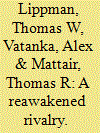

|
|
|
| 2 |
ID:
120283
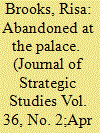

|
|
|
| 3 |
ID:
120295
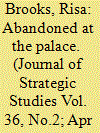

|
|
|
|
|
| Publication |
2013.
|
| Summary/Abstract |
Many analysts have focused on the Tunisian protests and the economic and political grievances that fueled them. Equally central, however, was the role played by the military leadership and the decision to forgo using force to actively suppress the protesters. Contrary to arguments that stress the reflexively apolitical or professional nature of the military, or its leaders' normative commitment to supporting the protesters, this article explains how the decisions made reflected political calculations and served the military's organizational interests. Although heralded as the savior of the revolution, the Tunisian military acted out of its own organizational self-interest in defecting from the Ben Ali regime.
|
|
|
|
|
|
|
|
|
|
|
|
|
|
|
|
| 4 |
ID:
124802


|
|
|
|
|
| Publication |
2013.
|
| Summary/Abstract |
TWO COMMON PEOPLE - Beshir Sassi, a jobless from Tunisia, and Abdelhamid Gohar, a peasant from Egypt, told me: "We are glad that we had a Revolution. Now we have a lot of freedom and democracy. Nobody can arrest us because of our thoughts which are different from what our rulers think. Life has not become better yet we have become freer - this is the main thing."
This was my strongest impression of people in Tunisia and Egypt I met during the last few weeks on the eve of the second anniversary of the so-called Arab Spring, which had started in January 2011 in Tunisia and spread to Egypt in February 2011.
|
|
|
|
|
|
|
|
|
|
|
|
|
|
|
|
| 5 |
ID:
118782
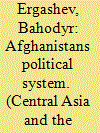

|
|
|
| 6 |
ID:
138554


|
|
|
|
|
| Summary/Abstract |
OUAGADOUGOU, Burkina Faso—It’s 6 a.m. in a refugee camp at Breidjing in the eastern reaches of Chad. A military escort, charged with ensuring several visitors safe passage to Farchana, 15 miles away, is making haste slowly across difficult depressions in the heavily rutted road—scars inflicted by a season of overly-generous rains. But in the middle, there are also crevasses representing scars of recent history. In this zone, which welcomes tens of thousands of exiles from Darfur, weapons circulate incessantly from hand-to-hand—one-time militiamen turn bandits on the big highways.
|
|
|
|
|
|
|
|
|
|
|
|
|
|
|
|
| 7 |
ID:
118266
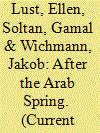

|
|
|
|
|
| Publication |
2012.
|
| Summary/Abstract |
Although Islamism is helping to shape political transitions in the Arab world, this does not foreclose the possibilities of democratization.
|
|
|
|
|
|
|
|
|
|
|
|
|
|
|
|
| 8 |
ID:
126068
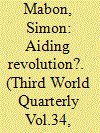

|
|
|
|
|
| Publication |
2013.
|
| Summary/Abstract |
This article explores the role of external actors in facilitating the uprisings in Egypt that have become known as the Arab Spring. It analyses several of the diplomatic cables released by the Wikileaks organisation that possess an Egypt focus. The article suggests that while the cables did not make surprising revelations to Egyptians, the release of this information offered a source of external legitimacy for the protesters by detailing a history of oppression and human rights abuses; conversely, the cables delegitimised the Mubarak regime. The data were then spread via different channels of communication to aid the protest movements both internally and externally. The article concludes by suggesting that while this information was incredibly important, as were the channels of communication used to facilitate events and spread the information, one must be careful not to diminish the importance of agency.
|
|
|
|
|
|
|
|
|
|
|
|
|
|
|
|
| 9 |
ID:
160662
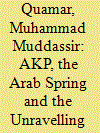

|
|
|
|
|
| Summary/Abstract |
The rise of the Adalet ve Kalkınma Partisi (AKP), its domestic and foreign policy successes and its early response to the Arab Spring made it popular in the Arab world. Many inside Turkey, the US and the Arab world saw the AKP as an Islamist party with a difference, that could be a ‘model’ for the Arab countries struggling with a democratic deficit. The violent turn taken by the uprisings in Syria, Iraq and Egypt and the internal developments in Turkey that followed afterwards, however, exposed the limitations of the ‘model.’ This essay argues that Turkey cannot be a ‘model’ as it suffers from shortcomings, but it can offer some lessons for the Arab world.
|
|
|
|
|
|
|
|
|
|
|
|
|
|
|
|
| 10 |
ID:
141371
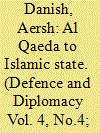

|
|
|
| 11 |
ID:
132511
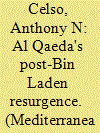

|
|
|
|
|
| Publication |
2014.
|
| Summary/Abstract |
The Barack Obama administration's May 2013 assessment of al Qaeda's weakness and fracturing in the post-bin Laden era has been greeted with indignation by both liberals and conservatives. They believe al Qaeda is stronger than ever in the wake of the Arab Spring. These critics, however, misunderstand the network's dysfunctional direction. Al Qaeda's "resurgence" is likely to lead to its failure. The argument proceeds on four levels: (1) the dramatic growth of the al Qaeda network masks its internal weakness and organizational splintering; (2) the Arab Spring has led to a burst of al Qaeda activism that is likely to undermine its jihadist cause; (3) al Qaeda's fragmentation and its multiple trajectories in the post-9/ 11 era violate bin Laden's original intent and are beyond al Qaeda Central's direction; and (4) the dysfunctional nature of al Qaeda's ideology and its excessive reliance on takfiri violence is paradoxically a source of both persistence and failure.
|
|
|
|
|
|
|
|
|
|
|
|
|
|
|
|
| 12 |
ID:
187261
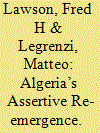

|
|
|
|
|
| Summary/Abstract |
Algeria is re-emerging as an active player in international politics following the Arab Spring uprisings that swept across the Middle East and North Africa beginning in 2010–11. But it has adopted a much different posture from the one it maintained during the 1960s and 1970s. The broadly accommodative attitude that Algiers previously exhibited towards the outside world has been replaced by a more combative stance. Military power has become its primary tool for managing inter-state disputes, and Algeria has stepped up its involvement in the domestic affairs of nearby states. These changes have contributed to the resurgence of conflict in North Africa at a moment when the regional order might well have moved in a more peaceful direction.
|
|
|
|
|
|
|
|
|
|
|
|
|
|
|
|
| 13 |
ID:
137408


|
|
|
| 14 |
ID:
111251
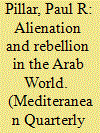

|
|
|
|
|
| Publication |
2011.
|
| Summary/Abstract |
The revolts known collectively as the Arab Spring are largely reactions of alienated populations to the closed economic and political systems that prevail in the Middle East. Revolutions in individual countries have differed because of the differing status of the military, sectarian divisions, and mineral wealth. The prospect of peaceful political change reduces the appeal of extremist ideologies, but extremists still could make inroads to the extent that high popular hopes are dashed. Democracy will need a long time to take root in Arab political cultures.
|
|
|
|
|
|
|
|
|
|
|
|
|
|
|
|
| 15 |
ID:
158001
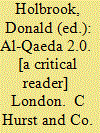

|
|
|
|
|
| Publication |
London, C Hurst and Co. (Publishers) Ltd, 2017.
|
| Description |
xiv, 291p.pbk
|
| Standard Number |
9781849048101
|
|
|
|
|
|
|
|
|
|
|
|
Copies: C:1/I:0,R:0,Q:0
Circulation
| Accession# | Call# | Current Location | Status | Policy | Location |
| 059348 | 303.625/HOL 059348 | Main | On Shelf | General | |
|
|
|
|
| 16 |
ID:
139028
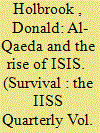

|
|
|
|
|
| Summary/Abstract |
Ayman al-Zawahiri’s leadership of al-Qaeda has been beset by a series of calamities that threaten the viability of the movement’s core group and its legacy. Zawahiri was always more suited to be second in command, offering dense strategic and ideological deliberations rather than acting as the public face of a global Islamist militant movement. Replacing the charismatic Osama bin Laden was thus always going to be a challenge. The fact that secular Arab rulers, especially in Egypt (Zawahiri’s native land and a consistent preoccupation of his), have been toppled on his watch through popular uprising and military intervention – as opposed to jihadist coercion – has further undermined Zawahiri’s position as al-Qaeda leader. The Arab Spring uprisings demonstrated the success of regime-change methods that al-Qaeda had consistently dismissed, while removing some of the main protagonists of its grievance narrative.
|
|
|
|
|
|
|
|
|
|
|
|
|
|
|
|
| 17 |
ID:
107590
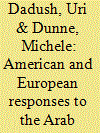

|
|
|
| 18 |
ID:
126202
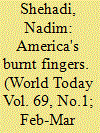

|
|
|
| 19 |
ID:
144784


|
|
|
|
|
| Summary/Abstract |
Various reflections on the ‘Arab Spring’ evince a common view of the relationship between change and time that imbues events with a sense of intrinsic peril. Based on a framework developed from Norbert Elias’s concept of timing, this article elaborates the relationship between time and the ‘Arab Spring’ by unpacking and explaining three rhetorical tropes prevalent in academic responses to the revolts. The first two construct a problem to which the third proffers a solution. First, analysts treat time itself as a problematic force confounding stability and progress. Second, they deploy fluvial metaphors to present dynamic events as inherently insecure. Third, they use temporal Othering to retrofit the ‘Arab Spring’ to the familiar arc of liberal democracy, which renders the revolts intelligible and amenable to external intervention. These moves prioritize certainty and order over other considerations and constrain open-ended transformations within a familiar rubric of political progress. They also constitute an active timing effort based on a conservative standard, with important implications for our understanding of security and for scholarly reflexivity. The article concludes with three temporal alternatives for engaging novel changes like the ‘Arab Spring’.
|
|
|
|
|
|
|
|
|
|
|
|
|
|
|
|
| 20 |
ID:
163109
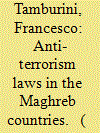

|
|
|
|
|
| Summary/Abstract |
This article sheds light on the counter-terrorism measures enacted by the Maghreb countries, with a comparative approach of the laws in Algeria, Mauritania, Morocco, and Tunisia. Carried out by comparing the Arabic and French original versions, the analysis revealed a common attitude that tended to preserve national security at the expenses of civil freedoms and human rights. In almost all cases, anti-terrorism laws strayed away from their supposed initial finality – fighting terrorism – tackling other issues such as the maintenance of public order or indirectly the control of dissidence and political opposition, with no or scarce legal checks and balances that could restrict possible police or judiciary abuses towards civil and political rights. The legal measures significantly delayed both the first transition to democracy in the region in the 2000s as well as the promising development after the ‘Arab spring’.
|
|
|
|
|
|
|
|
|
|
|
|
|
|
|
|